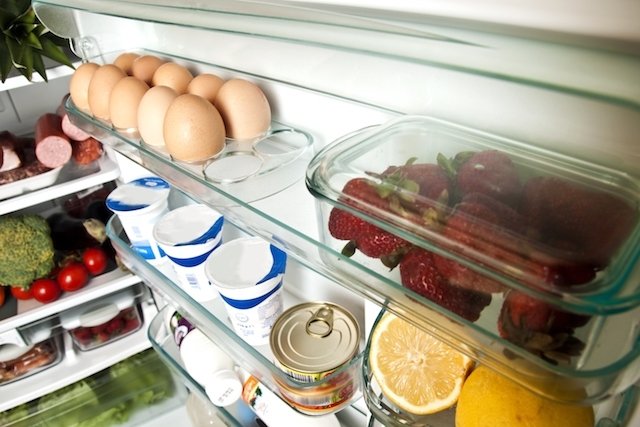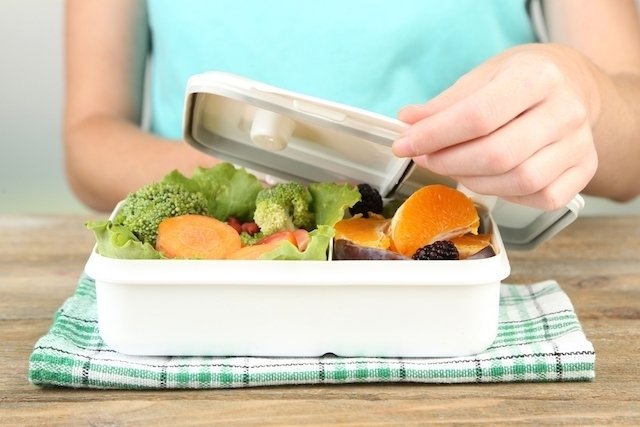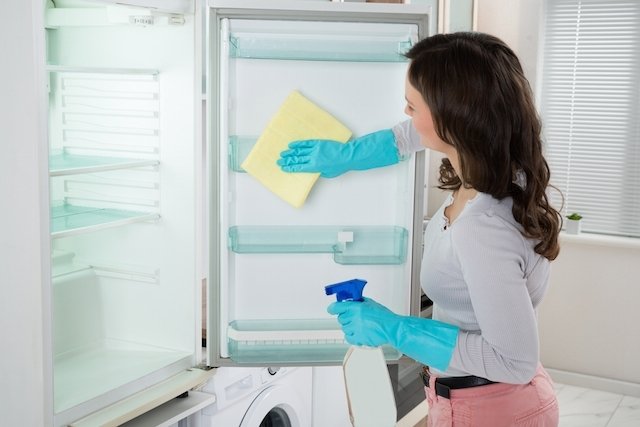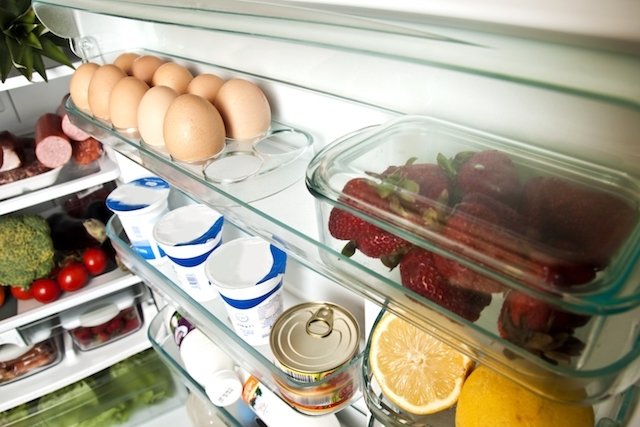To keep food in the refrigerator for longer, without the risk of spoilage, you need to cook and store food properly and be careful about cleaning the kitchen, countertops and your hands.
Furthermore, the refrigerator temperature must always be kept below 5ºC, as the lower the temperature, the slower the growth of microorganisms that spoil food and cause intestinal infections such as gastroenteritis, which generates symptoms such as acute abdominal pain. and diarrhea.

Foods that can be frozen
You can store food in the freezer or freezer to make it last longer. It is practically possible to freeze all foods, although some require some specific care. Some foods that can be frozen are:
- Yogurt: it can be useful if you want to take it to the picnic because when you eat it it must be defrosted;
- Leftovers from a birthday cake: They can be stored in a clean, dry container, like an old ice cream container, but you should place a napkin underneath. To defrost, simply leave it in the refrigerator, but it should not be refrozen again;
- Meal leftovers: in its own packaging, which can be made of BPA-free plastic or glass, but always well identified, to defrost use the microwave or leave it to defrost in the refrigerator;
- Carnes: they can be stored inside the bag that comes from the butcher’s shop, the packaging that comes from the market or inside square or rectangular containers, which allow greater use of space;
- Vegetables, greens and fruits: they can be stored in freezer bags of different sizes, but they must be cut and always dry before freezing. To freeze bananas, first peel them and wrap each one in plastic wrap, they are great for making fruit smoothies. Learn how to freeze fruit pulp.
- Sliced cheese and ham: they can be stored inside BPA-free plastic boxes, well closed or in glass jars with lids;
- French bread, baguette or sliced bread: They can be frozen in freezer bags, or individually with plastic wrap.
Learn how to freeze vegetables without losing nutrients.
Shelf life of food in the refrigerator
Even if a food looks good in the refrigerator, it may be contaminated with fungi and bacteria, which is why each food’s expiration date must always be respected. The following table shows the shelf life of food when stored correctly in the refrigerator.
To make food last longer, it is important to store it in clean glass or plastic containers with a lid, so that they do not come into contact with other foods, especially raw foods.
How to organize food in the fridge
Each food in the refrigerator must be stored in closed containers or bags, so that it does not come into contact with other products that may be contaminated. Furthermore, you should not overcrowd the refrigerator, so that cold air circulates more easily and preserves food for longer.
To reduce the risk of food contamination, the refrigerator must be organized as follows:
- Upper part: yogurts, cheeses, mayonnaise, pâtés, ham and eggs;
- Middle part: on the top shelf, place cooked food;
- Bottom shelf: raw meat and fish or those in the process of defrosting;
- Drawer: fresh fruits and vegetables;
- Porta: milk, olives and other preserves, condiments, butter, juices, jellies, water and other drinks.
A tip to preserve chopped vegetables and spices for longer, you must wash and dry each vegetable well before placing them in the refrigerator, covering the storage container with paper towel to absorb the excess water that forms in the cold environment. .
Furthermore, in the case of milk, for example, which is recommended to be kept on the refrigerator door, it is important that it is consumed as indicated on the label. This is because as the milk remains on the refrigerator door, it is exposed to more temperature variations due to opening and closing the refrigerator, which can favor the development of harmful microorganisms and lead to infections, even if it is within its expiration date. .
Foods that don’t need to be kept in the fridge
The list below indicates foods that do not need to be stored in the refrigerator:
- Onion because it spoils faster than in the pantry;
- Garlic because it can become flavorless and moldy faster;
- Tomato because it can lose its flavor;
- White potato or sweet potato because they can be drier and take longer to cook;
- Pickled pepper because it already has ingredients that prevent it from spoiling;
- All types of bread because it makes it drier quickly;
- Honey or molasses because they will crystallize;
- Fruits such as banana, apple, pear, tangerine or orange because they lose their antioxidants, the ideal is to buy in smaller quantities;
- Fruits such as papaya, watermelon, melon or avocado Once opened, they can be stored in the refrigerator wrapped in plastic wrap;
- Pumpkin because it loses liquid and flavor and therefore needs to be stored in a dark, but well-ventilated place;
- Peanut butter and Nutella because they become hard and dry, so they should always be in the pantry or on a clean counter, with the packaging tightly closed;
- Carrot because it can become dry and tasteless, prefer an airy place, but protected from light;
- Chocolates even if they are opened because it becomes hard and tends to have a different smell and flavor, never leave it near the onion;
- Breakfast cereals because they may be less crunchy;
- Condiments and spices such as oregano, parsley, chili powder, paprika should not be kept in the refrigerator because they can become damp and lose their flavor;
- Industrialized sauces like ketchup and mustard they do not need to be kept in the refrigerator because they contain preservatives that keep them for a long time even at room temperature;
- Biscuits even in open packaging because the humidity can take away the crunchiness and give it a different flavor than the original.
Eggs can be stored in the refrigerator because they only last 10 days at room temperature, but they can last longer when placed in the refrigerator because the cold temperature helps preserve them.
When the fruit is very ripe, it is advisable to place it in the refrigerator because this helps it ripen and makes it last longer, but for better preservation of fruits and vegetables, it is recommended to only buy enough for the week, as this way they do not run the risk of spoiling. easily in the pantry, there’s no need to even store it in the fridge.
How to store leftover meals

Hot food should not be placed in the refrigerator because in addition to ruining the functioning of the refrigerator, it can allow the development of microorganisms that may be inside the refrigerator, in spoiled food, for example. Therefore, when storing leftovers from lunch or dinner, let them cool first and then store them in the refrigerator.
To freeze leftover meals, place them in a BPA-free plastic container or in a glass container with a lid in the quantity you want. You can save the ‘made dish’ to eat another day, when you don’t have time, or you can freeze the rice, beans and meat in separate containers.
The most correct way to freeze leftovers is to place them in the container of your choice, as long as it is clean and dry, and then place them inside a tray with cold water and ice cubes, as this will quickly change the temperature, allowing the food to last longer.
How to get rid of the bad smell in the refrigerator

To clean the refrigerator well and remove the bad smell, you must follow the following steps:
- Unplug and throw away any food that may be spoiled in the trash;
- Remove the drawers and shelves and wash them with hot water and detergent. Then apply vinegar or lemon, rinse and let it dry naturally or wipe with a clean cloth;
- Clean the entire refrigerator with water and detergent;
- Clean the exterior with a clean, soft cloth;
- Clean the condenser coil with a brush;
- Place the shelves and organize the food back;
- Turn on the device and adjust the temperature between 0 and 5ºC.
If the refrigerator is kept clean on a daily basis, a deeper cleaning should be done every 6 months, but if it is constantly dirty and contains food residues, general cleaning should be done monthly.
Tips for cleaning the kitchen
Hygiene in the kitchen is necessary to reduce the risk of food contamination in the refrigerator, it is important to wash the utensils, sponge and sink cloths with water and detergent after use, remembering to also wash the countertop and dish drainer at least at least once a week, using lemon, vinegar or bleach to help with cleaning.
A good tip for cleaning your dish sponge is to fill it with water and heat it in the microwave for 1 minute on each side. In addition, you should use different cutting boards for meat, fish and vegetables, and use a trash can with a lid, so that food remains are not exposed to insects.

Sign up for our newsletter and stay up to date with exclusive news
that can transform your routine!
Warning: Undefined array key "title" in /home/storelat/public_html/wp-content/plugins/link-whisper-premium/templates/frontend/related-posts.php on line 12
Warning: Undefined array key "title_tag" in /home/storelat/public_html/wp-content/plugins/link-whisper-premium/templates/frontend/related-posts.php on line 13




